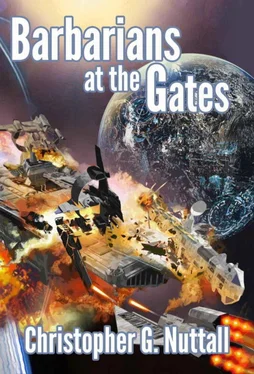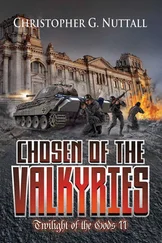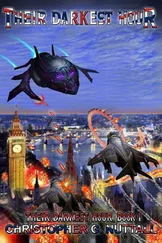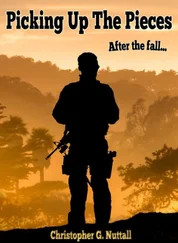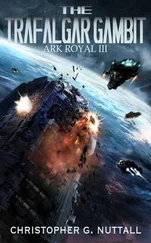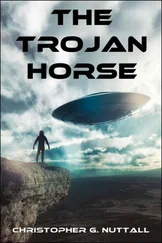“Stow it,” he ordered sharply. “We will concentrate on getting out of here. The rest we leave to the admiral.”
* * *
Marius wanted a shower desperately as his fleet crawled towards the mass limit. It felt as if they had been fighting for days, not hours, and he was alarmingly aware of his own stink. The crew looked tired and worn, looking to him to get them out of this nightmare. He rubbed the side of his chin and felt stubble, taunting him. The only consolation was that Justinian’s fleet had to be in the same condition.
“Admiral, they are launching starfighters,” the tactical officer reported. He should have been relieved long ago, but the secondary tactical officer was needed on the secondary bridge. “They seem to be preparing a final strike.”
“Prepare our own fighters for launch,” Marius ordered slowly. The fighter jocks were exhausted. He’d given the order to have stimulants issued to the pilots, even though they knew that stimulants could impair judgement and coordination. There hadn’t been any other choice, even when one of his remaining pilots had nearly killed a second one under the impression that he’d been an enemy. “Combine our squadrons and stand by to launch them on my command…”
The enemy fighters screamed in towards his ships and his own weary pilots went forward to meet them. Both sides were clearly tired—thankfully, their mechanical servants never got tired. Many of Justinian’s fighters died as they were picked off by the point defense network, their reaction times clearly impaired. But two more of Drake’s superdreadnaughts were blown apart before Justinian’s fighters started to fall back, evading Drake’s vengeful starfighters as they retreated.
Marius knew that it wouldn’t be long before Justinian’s starships opened fire again.
“Admiral,” the sensor officer reported, “they’re falling back!”
“What?” Marius demanded. “They’re falling back?”
The display showed the enemy fleet reducing speed and recovering their fighters. If it was a trick, they gained nothing from it, not even a chance to convince Marius to slow his own ships at the same time. The distance between the two fleets widened sharply, until every bit of the remaining Retribution Force was safe. At this point, even Justinian’s starfighters would have problems catching up with them before they crossed the mass limit and escaped…that is, if Justinian had any pilots left in any shape to fly.
“Bring up the stardrive on all ships as soon as we cross the mass limit,” Marius said. He’d barely had any time to think about their course, but he had to pick something that might work once they went FTL. He pulled up a star chart—with bright white lines showing the Asimov Point network—and frowned. There weren’t many options. “Set course for FAS-836393.”
“Aye, sir,” the helmsman said. He sounded relieved. “Stardrive activation in…seventeen minutes.”
A star’s value can be measured in three ways. Does it have a life-bearing planet or one that can be easily terraformed? Does it have a gas giant that can be mined for He 3? And, most importantly of all, does it have any Asimov Points? A star with nothing but Asimov Points may be of immense significance to the astropolitical planner.
-Federation Navy Tactics and Strategy, 4000 A.D.
Jefferson System/FAS- 836393/Boskone System, 4092
“The enemy fleet has crossed the mass limit,” Caitlin reported.
She was too much of a professional to show her surprise, but Justinian had known her long enough to guess what she was thinking. He hadn’t given up the chance to destroy the Senatorial lackeys, no matter what it looked like. Yet he could have crippled or destroyed many more ships before the remainder escaped, so she had to be wondering why he didn’t do it.
“They will be going FTL as soon as possible,” she said.
“Leaving behind a number of cripples,” Justinian said. He allowed himself a smile. Marius Drake had done well to extract most of his force from what had been intended as a death trap, but he’d had to abandon nearly thirty starships. “Pass on the message; I want the Marines to accept surrenders and take the ships intact.”
“They’ll blow the computers,” Caitlin warned. “Sir, why…?”
Justinian smiled again, doing his best to project some warmth.
“We could have pressed our advantage and perhaps destroyed additional ships,” he told her. “This way, however, those lackeys know that we will accept surrenders and may not be willing to fight to the death—not for the Senate.”
He grinned up at her, and then looked back at the display. “And that way, we can regroup and advance against the nearest fleet base before Drake’s forces can get back in contact with the rest of the Federation.”
He stood up and strode to the airlock. “Stand the fleet down and start repair work at once,” he added. “I want to be ready to move within seventy-two hours.”
* * *
“Stardrive engaged, sir,” the helmsman said. “We’re clear.”
Roman allowed himself a moment of pure relief. His mind had come up with all kinds of theories about what Admiral Justinian might be playing at when he allowed the remainder of the Retribution Force to escape. Justinian might be sending a force around outside the mass limit to intercept and destroy the fleeing ships, or he might have other plans…or he might even have run out of missiles. But whatever the reason, Enterprise was safe…at least for the moment.
Intercepting a starship under continuous displacement drive was almost impossible. The entire fleet had gone into FTL together—allowing them to communicate and even shuttle from one ship to another—but any pursuing forces would have to somehow insert themselves into the displacement field surrounding the fleet.
“Stand down from condition-one,” he ordered. He was mildly surprised that Admiral Drake hadn’t relieved him the moment he’d heard that a mere lieutenant had assumed command of the Federation’s flagship. “The damage control crews can continue to make basic repairs; the tactical and conning crew can get some rest.”
He turned and looked up at the ship’s status display. The damage control teams had worked wonders, sealing off the damaged parts of the ship and ensuring that the ship’s structural integrity would remain intact. It didn’t take years of experience to know that Enterprise would need at least six months in a shipyard before she could be declared fully operational, but they’d make it home. Roman was in no doubt of that.
He flicked through the next part of the report and shook his head. They’d fired off most of their missiles in the final engagement, and needed to rearm. And they’d lost over three-fourths of their fighters.
“Sir,” Sultana said slowly, “you need to get some sleep yourself.”
Roman hesitated. He didn’t want to leave the bridge. There might be another crisis that would require his personal intervention, at least until he was relieved of command. And then there was the problem that there were only a handful of command-track officers left alive. They all needed sleep. His tired mind refused to grapple with chain of command issues. He honestly couldn’t place who was next in command and who didn’t need sleep. The chief engineer wasn’t in the chain of command, nor was the ship’s doctor, or the intelligence officers who had been attached to Admiral Parkinson—those who remained alive. He made up his mind and scowled. Appointing someone outside the command track to take command, if only for a few hours, was a violation of regulations.
Читать дальше
